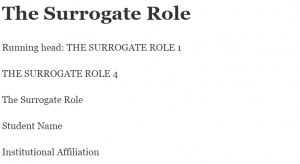The Surrogate Role

Running head: THE SURROGATE ROLE 1
THE SURROGATE ROLE 4
The Surrogate Role
Student Name
Institutional Affiliation
Course
Date
The Surrogate Role
Based on Peplau’s theory, the nurse’s surrogate role is when they act as a substitute or advocate for another human who is well-recognized to the client, such as a sibling, parent, relative, teacher, or friend. In the process, a client can unconsciously transfer emotions or behaviors attached to the significant other onto the provider/nurse. The nurse responds to help the client to know the differences and similarities between themselves and others (Hagerty et al., 2017). The nurse clarifies the activities that require the patient’s independence, dependence on the nurse, and interdependence. In nursing homes or intensive care units, a nurse may become a surrogate when patients depend on nursing care.
This role can be seen throughout the contemporary nursing process and may be leveraged to accurately and appropriately deliver solutions within healthcare. For instance, the surrogate role is witnessed when caring for psychiatric or mental health patients. Within the therapeutic environment, the nurse nurtures an accepting ambiance wherein the client feels secure physically and emotionally, relaxed, and can freely share their thoughts and feelings. Such a situation is achieved if the nurse is honest, friendly, sincere yet firm and non-judgmental to the client (Hagerty et al., 2017).In this environment, the nurse utilizes the principle of psychotherapy to assist the client in recognizing their feelings, emotions, behavior, and thoughts while helping them find solutions to their problems. In nursing homes and intensive care units, the nurse’s surrogate role is seen when they act as parent surrogates through activities such as dressing, feeding, bathing, or rubbing the patient. The nurse also helps the patient understand why they could be in pain and assure them of priority given to their well-being.
The nurse focuses on the patient’s reactions and the intended health outcomes as the patient progresses toward positive health outcomes. Alongside the surrogate parent, the nurse may be the care provider, the counselor, or the educator in such situations. This scenario allows the nurse to utilize professional knowledge, skill, and education to address a health problem. It is a crucial period for the patient when the nurse serves as the surrogate parent as they identify the nurse as consistently helping, providing empathy, and providing unconditional care. The surrogate role primarily revolves around the nurse-patient relationship during care, necessitating tactful and skillful communication between the nurse and patient (Wasaya et al., 2021). When patients are in critical conditions, such as in an emergency or feeling helpless, the nurse’s reassurance as the surrogate parent promotes their overall health and well-being. This way, nurses working in these areas assist patients in regaining their health and well-being. Nurses often utilize a combination of conceptual frameworks and theories in their everyday nursing practice. Concepts from various approaches, such as Peplau’s, continue to evolve and guide contemporary nursing and the future. Nurses must apply for the surrogate role in the context of their application environments and populations to drive positive health outcomes.